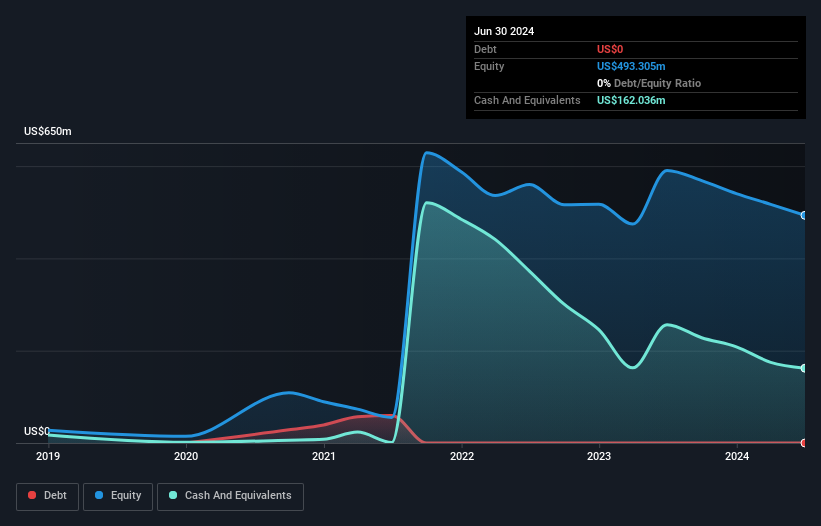- United States
- /
- Specialty Stores
- /
- NasdaqGS:EVGO
We're Not Very Worried About EVgo's (NASDAQ:EVGO) Cash Burn Rate

Even when a business is losing money, it's possible for shareholders to make money if they buy a good business at the right price. Indeed, EVgo (NASDAQ:EVGO) stock is up 215% in the last year, providing strong gains for shareholders. Having said that, unprofitable companies are risky because they could potentially burn through all their cash and become distressed.
So notwithstanding the buoyant share price, we think it's well worth asking whether EVgo's cash burn is too risky. In this report, we will consider the company's annual negative free cash flow, henceforth referring to it as the 'cash burn'. The first step is to compare its cash burn with its cash reserves, to give us its 'cash runway'.
View our latest analysis for EVgo
Does EVgo Have A Long Cash Runway?
You can calculate a company's cash runway by dividing the amount of cash it has by the rate at which it is spending that cash. When EVgo last reported its June 2024 balance sheet in August 2024, it had zero debt and cash worth US$162m. Importantly, its cash burn was US$125m over the trailing twelve months. Therefore, from June 2024 it had roughly 16 months of cash runway. That's not too bad, but it's fair to say the end of the cash runway is in sight, unless cash burn reduces drastically. You can see how its cash balance has changed over time in the image below.

How Well Is EVgo Growing?
We reckon the fact that EVgo managed to shrink its cash burn by 54% over the last year is rather encouraging. And arguably the operating revenue growth of 82% was even more impressive. Overall, we'd say its growth is rather impressive. While the past is always worth studying, it is the future that matters most of all. So you might want to take a peek at how much the company is expected to grow in the next few years.
How Hard Would It Be For EVgo To Raise More Cash For Growth?
While EVgo seems to be in a fairly good position, it's still worth considering how easily it could raise more cash, even just to fuel faster growth. Companies can raise capital through either debt or equity. One of the main advantages held by publicly listed companies is that they can sell shares to investors to raise cash and fund growth. By looking at a company's cash burn relative to its market capitalisation, we gain insight on how much shareholders would be diluted if the company needed to raise enough cash to cover another year's cash burn.
Since it has a market capitalisation of US$2.4b, EVgo's US$125m in cash burn equates to about 5.3% of its market value. Given that is a rather small percentage, it would probably be really easy for the company to fund another year's growth by issuing some new shares to investors, or even by taking out a loan.
Is EVgo's Cash Burn A Worry?
It may already be apparent to you that we're relatively comfortable with the way EVgo is burning through its cash. For example, we think its revenue growth suggests that the company is on a good path. Its weak point is its cash runway, but even that wasn't too bad! Based on the factors mentioned in this article, we think its cash burn situation warrants some attention from shareholders, but we don't think they should be worried. On another note, EVgo has 2 warning signs (and 1 which doesn't sit too well with us) we think you should know about.
If you would prefer to check out another company with better fundamentals, then do not miss this free list of interesting companies, that have HIGH return on equity and low debt or this list of stocks which are all forecast to grow.
Valuation is complex, but we're here to simplify it.
Discover if EVgo might be undervalued or overvalued with our detailed analysis, featuring fair value estimates, potential risks, dividends, insider trades, and its financial condition.
Access Free AnalysisHave feedback on this article? Concerned about the content? Get in touch with us directly. Alternatively, email editorial-team (at) simplywallst.com.
This article by Simply Wall St is general in nature. We provide commentary based on historical data and analyst forecasts only using an unbiased methodology and our articles are not intended to be financial advice. It does not constitute a recommendation to buy or sell any stock, and does not take account of your objectives, or your financial situation. We aim to bring you long-term focused analysis driven by fundamental data. Note that our analysis may not factor in the latest price-sensitive company announcements or qualitative material. Simply Wall St has no position in any stocks mentioned.
About NasdaqGS:EVGO
EVgo
Owns and operates a direct current fast charging network for electric vehicles in the United States.
Excellent balance sheet and slightly overvalued.
Similar Companies
Market Insights
Community Narratives



